|
The George Hotel on the Bridge was
acquired by the Corporation in 1927 and demolished in
1934. In 1935 the new George Hotel opened, and stayed in
business until the early 1970s. The following brief
history of the hotel is from the official luncheon menu
for the reopening on Tuesday 12th November, 1935.
|
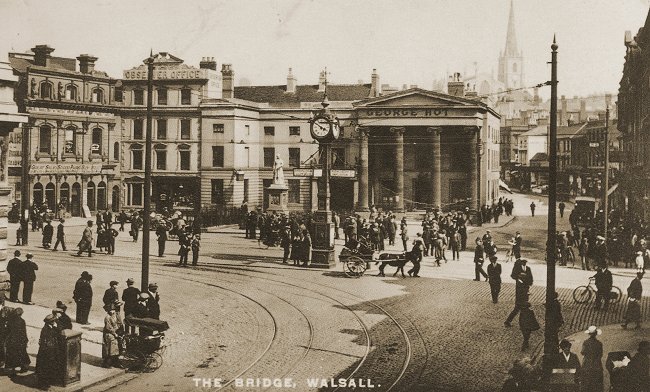 The George Hotel. From an old postcard.
The George Hotel. From an old postcard.
|
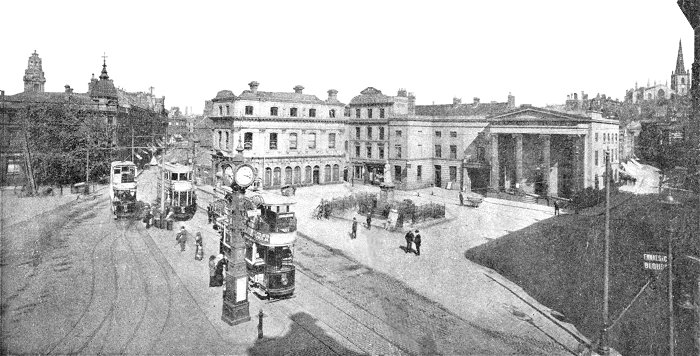
The George Hotel and
The Bridge in about 1914. |
|
Notes on the History of the George
Hotel, Walsall
By Herbert Lee, Town Clerk of
Walsall
The old George Hotel, on the site
of which, together with other land, the new George Hotel
has been built, was one of the famous Hostelries of the
old Coaching days.
The local historians differ as to
the year when the original George Hotel was built.
Willmore states that the Hotel was
built by Mr. Thomas Fletcher in 1721, but the late Mr.
W. H. Duignan gives the date as 1781, and C. G. Harper
in his book ‘The Old Inns of Old England’ also gives the
later date.
Mr. R. Yates, the great-grandson of
the founder (to whom I am greatly indebted for his help
and suggestions in the preparation of these notes),
points out, however, that Mr. Thomas Fletcher died in
1811, and that if he had built the George Hotel in 1721
at so early an age as 25, he would have been 115 years
old at his death, and over 80 when his children were
being born. This seems conclusive against the earlier
date.
In his history of Walsall, Willmore
says:
In 1721, Mr. Thomas Fletcher gave
up the "Dragon" in High Street, which at that time
shared with the "Bull's Head" in Upper Rushall Street
the distinction of being the best inn in the town, and
built the "George Hotel", which originally opened into
Digbeth.
In 1798 the Assembly Rooms were
added to the Hotel:
In 1823 the front of the hotel was
re-modelled. . . the large pillars being purchased in
1822 from the Marquis of Donegal, whose stately mansion
at Fisherwick Park they had formerly adorned. . .. The
late Earl of Derby was a great patron of the house on
his way between Knowsley and London, and also Lord
Hatherton, who presided at the Colonnade dinner in
August, 1823.
In 1826 the Hotel was greatly
enlarged, and it was recorded at the time that "This
Inn, without any exception, ranks the first in the
county, and reflects the highest credit on the
proprietor, Mr. R. M. Fletcher."
The following is an extract from
the Staffordshire Advertiser of June 30th (or July 7th),
1888, recounting the festivities in Walsall on the
occasion of the Coronation of Queen Victoria:
Mr. Fletcher, the spirited
proprietor of the George Hotel, seemed determined to
outvie all competitors. The magnificent pillars which
adorn the front of his house were covered with laurels
and ribbons, and festoons were carried from one to
another. The dinner was served up in his spacious
ballroom, which was decorated with appropriate devices
for the occasion, and was attended by about 80 gentlemen
of the greatest respectability. Lieut. Heely was
Chairman and Mr. S. Perks vice-chairman on the occasion.
Every coach, carriage, horse, and servant about his
extensive establishment was liberally supplied with
ribbons, and the whole arrangement was such as to
reflect great credit on the worthy landlord.
Perhaps the greatest service for
which Walsall is indebted to Thomas Fletcher and his
successors is the obtaining of a series of Road
Improvement Acts between 1784 and 1831, under which the
main road approaches to Walsall were improved and
straightened. Under the first Act, that of 1784, the
present road from Walsall to Stafford was made, and the
old Birmingham Road was widened and straightened as far
as Hamstead Bridge. Under an Act of the following year,
1785, the roads to Sutton Coldfield and Wolverhampton
(described as "ruinous and much out of repair, and in
many places narrow and incommodious") were dealt with.
In 1793, an Act was obtained to turnpike and improve the
road between Churchbridge and Stafford. Willmore says of
this last improvement:
By this alteration the road from
Birmingham to Liverpool, Manchester, Chester, and the
North, through Walsall, was made four miles shorter, and
thus the importance of the latter town as a thoroughfare
was largely increased. The old routes were deserted, and
the whole of the Birmingham traffic began to flow
through the town.
In 1831, an Act was obtained for
making a new turnpike road from Snail's Green, near the
Scott Arms, through Perry Barr to Birmingham. The
following are extracts from a Petition to the House of
Commons in support of the Bill, signed by "the Coach
Proprietors, Postmasters, and Waggon Proprietors on the
Road between Birmingham. . . and Walsall . . ." the list
of signatures being headed by that of R. M. Fletcher:
That there is but one turnpike road
between those towns which passes through Handsworth in
the said County of Stafford and that there are many and
very long and steep hills upon such road, and in
particular two hills called Hamstead Hill and Wren's
Hill between Handsworth aforesaid and a house called the
Quarry House in the occupation of Christopher Wren in
the township or liberty of Perry Barr in the said County
of Stafford;
That the length and steepness of
such hills causes the labour of the horses of your
petitioners in drawing their coaches, carriages, and
waggons along the said turnpike road to be unusually
great and wearisome and the travelling of the public to
be slow and tedious. . . .
That in the opinion of your
petitioners the proposed new turnpike road not having
any hill upon it of a wearisome or objectionable length
or acclivity and it being nearer than the present road
through Handsworth will be decidedly advantageous and
beneficial to the public at large. |
|
|
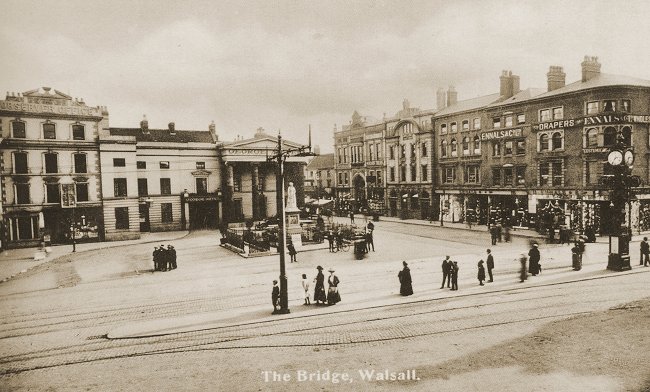 Another view of the George Hotel. From an
old postcard.
Another view of the George Hotel. From an
old postcard.
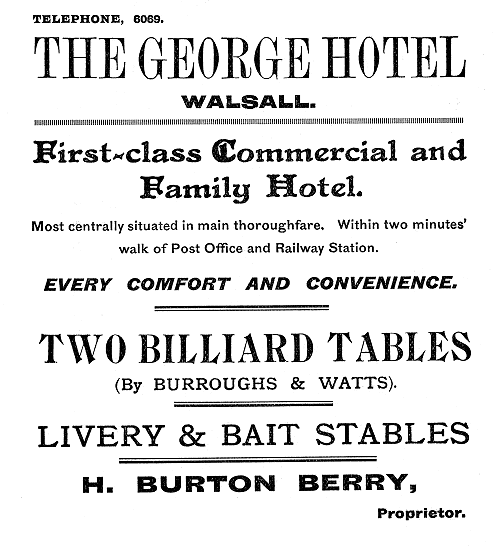 An advert from 1899.
An advert from 1899.
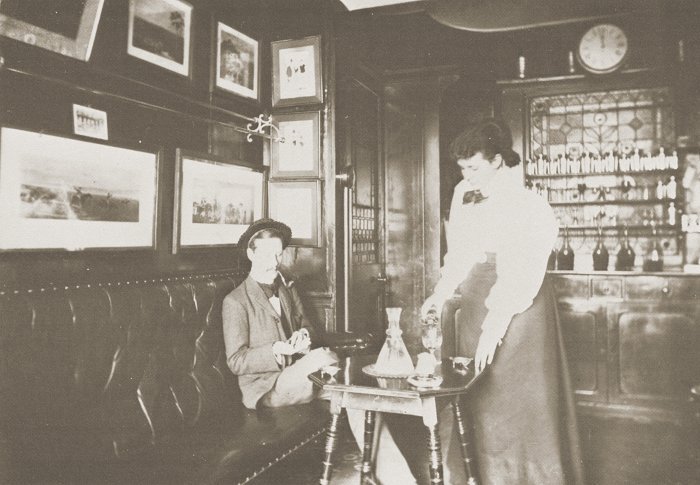
The bar in about 1900.
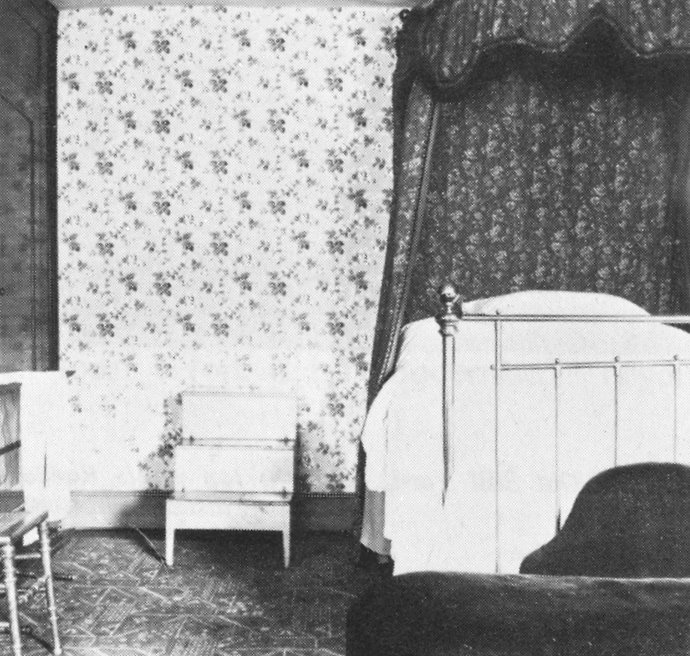
One of the bedrooms in about 1900.
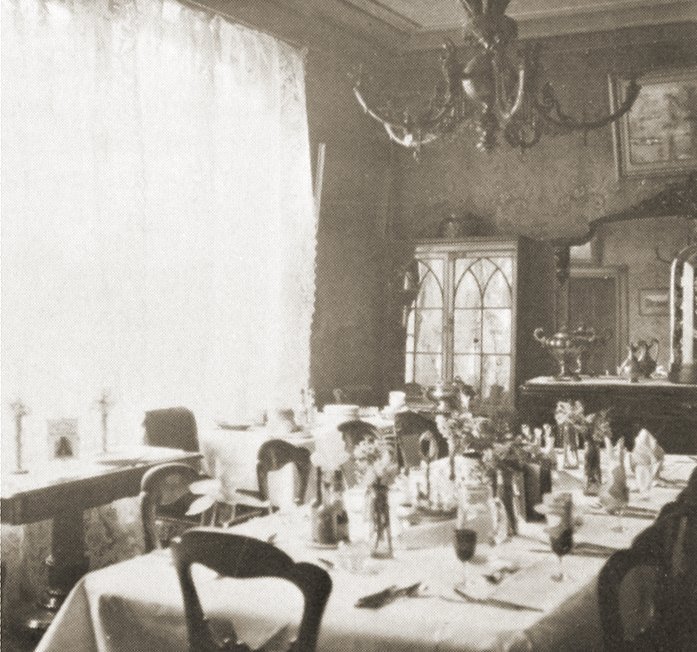
The dining room in about 1900.
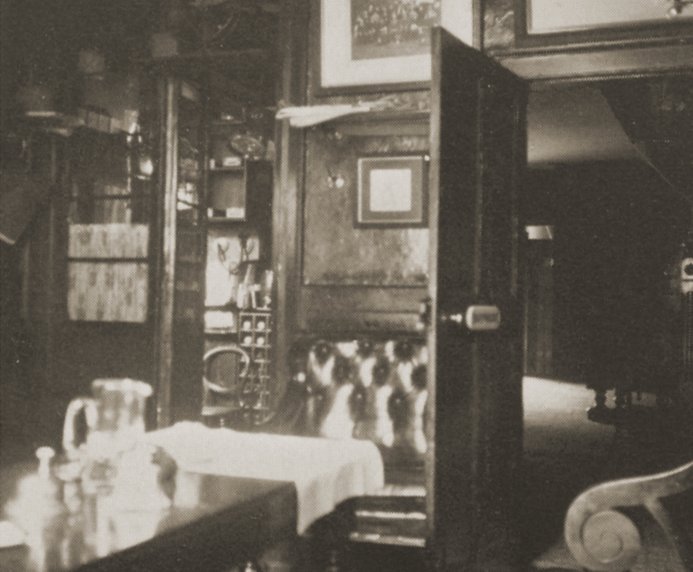
The lounge in about 1900.
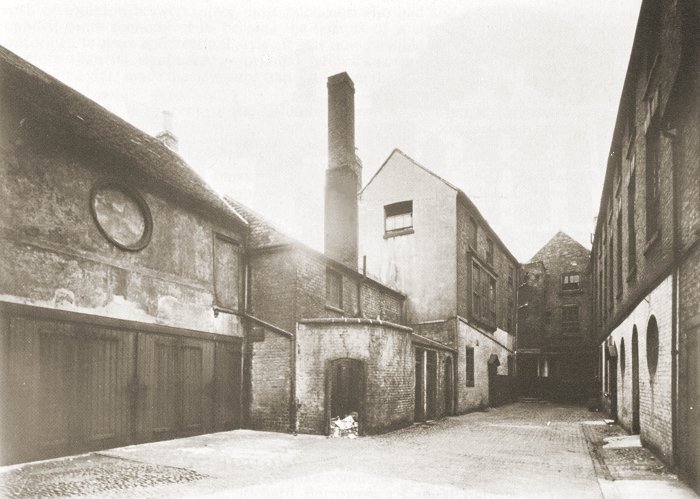
The yard and stables at the start of the 20th century.
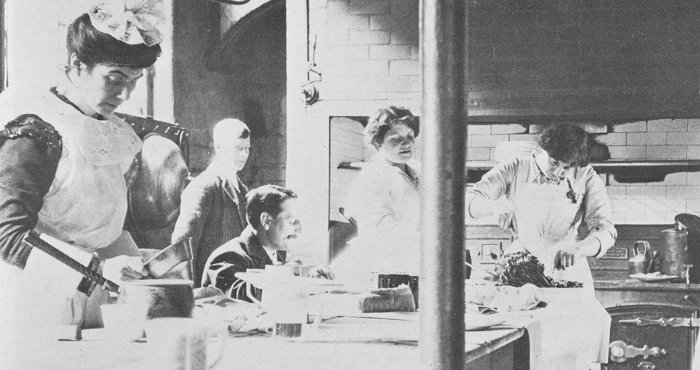
The kitchen.
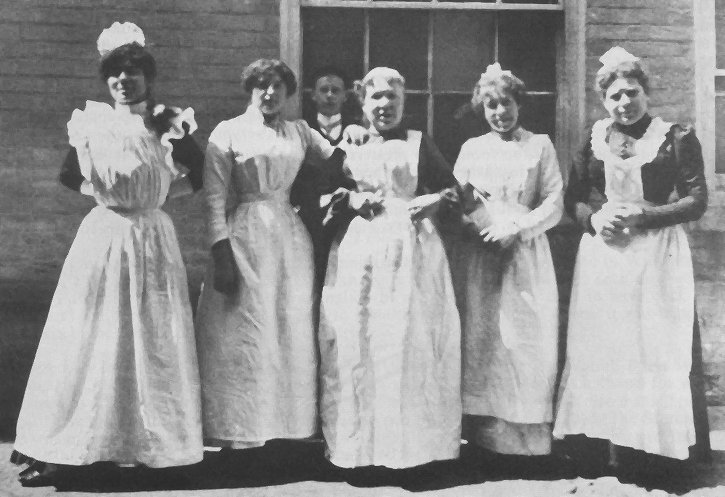
Members of the kitchen staff in
the early 1900s.
|
The following notes of the
successive ownership of the freehold of the George Hotel
have been kindly supplied by Mr. J. R. Yates:
1781 to 1811 Mr. Thomas Fletcher,
the founder.
1811 to 1865 Mr. Richard Moore
Fletcher, his Son (b. 1777, d. unmarried 1865).
1865 to 1895 Mr. Francis Henry
Yates, grandson of the founder.
1895 to 1920 Messrs. F. H. Yates
Jr. and J. R. Yates, great grandsons of the founder.
1920 to 1927 Messrs. Headley &
Jordison.
1927 Walsall Corporation.
Mr. Yates writes as follows:
The property in the land extended
in the Fletchers' time across The Bridge nearly to the
line of the Mill Fleam, and on one day in every year
they enclosed that space with ropes and stakes so as to
preserve their freehold. Later it was yielded up as a
public highway.
In 1854 Mr. R. M. Fletcher conveyed
to the Walsall Corporation his right and interest in
certain market and fair tolls payable in respect of the
use of part of The Bridge.
Whereas the said Richard Moore
Fletcher is or claims to be entitled to a proportion of
the market fair and other tolls arising from the use and
occupation of a certain portion of the land or ground in
front of the George Hotel in Walsall aforesaid upon
which some buildings (long ago pulled down) formerly
stood which portion of land or ground has for many years
past formed part of the open space called The Bridge
dedicated to the public and in all other respects one of
the streets highways or public places of the Borough
aforesaid and whereas the said Mayor Aldermen and
Burgesses have contracted and agreed with the
said Richard Moore Fletcher for the purchase of his said
interest or alleged interest in the said tolls at the
sum of one hundred and twenty five pounds.
The romance of the house, its
influence on the fortunes of the town through the energy
and enterprise of those who founded it, and the
enterprise of the Fletchers in obtaining Acts of
Parliament for making and improving main roads
approaching the town, have been recorded in a vivid
article by the late Mr. W. H. Duignan, published in the
Walsall Observer in 1878, a reprint of which is appended
to these notes.
In 1927 the Hotel was purchased by
the Walsall Corporation, and in 1934 the old Hotel was
demolished and the erection of a modern hotel commenced
by the Corporation on a site comprising the site of the
old George Hotel, together with the site of the original
"my lorde's mylle," and of the old Blue Coat School.
The "Lord's Mill" was an
appurtenance of the Manor of Walsall, and the burgesses
were obliged to grind all their corn at that mill and no
other, an obligation which, judging by the old records,
seems to have been honoured in the breach rather than
the observance. Until the erection of the "New Mills" at
the Pleck in the 18th century, the mill stood on the
site (afterwards occupied by the Walsall Observer
offices) between the George Hotel and the old Blue Coat
School.
The old Blue Coat School
(afterwards converted into a branch of the Midland Bank)
stood at the corner of Bridge Street and The Bridge
Square, until the new Blue Coat Schools were erected in
St. Paul's Street. These in their turn have now
disappeared, and been replaced by the new Schools
recently erected in Springhill Road, their site being
now occupied by the new Central Omnibus Station.
The new hotel was leased by the
Corporation to Mr. T. C. Gordon, of London and Glasgow,
who opened it for the reception of guests in May, 1935.
The Architect is Mr. James Taylor, A.R.I.B.A., and the
builders Messrs W. Bryant & Sons Ltd., of Birmingham.
The Borough Surveyor (Mr. John Taylor, M.Inst.C.E.) has
been associated with the Architect throughout in the
erection of the hotel.
Important shops are included in the
building, and have been leased by the Corporation to
well-known firms. The present members of the Property
Committee, which has been responsible for the building
and leasing of the new George Hotel and shops, are as
follows:
|
Alderman W. J. Pearman Smith
(Chairman)
Alderman E. H. Ingram
(Vice-Chairman)
Alderman E. Evans
Alderman W. D. Forsyth
Alderman A. J. Llewellen
Councillor W. H. Baker
Councillor S. E. Edge
Councillor W. Kendrick
Councillor E. B. Stammers
Councillor J. Whiston
|
|
|
|
|
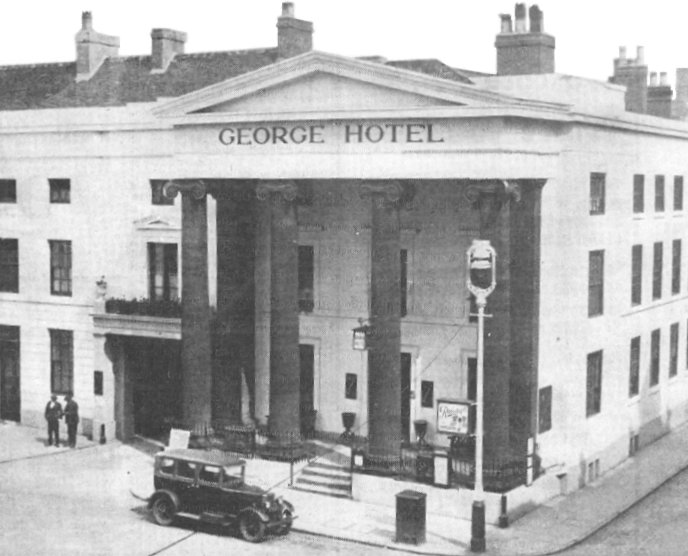 The George Hotel in the 1920s.
The George Hotel in the 1920s.
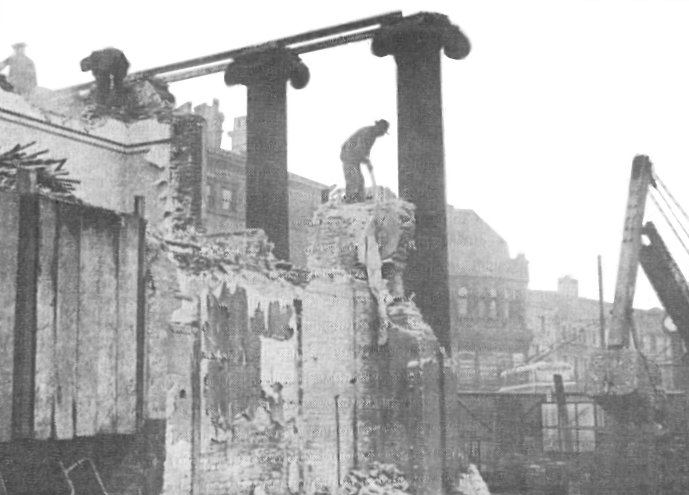 The original hotel during
demolition.
The original hotel during
demolition.
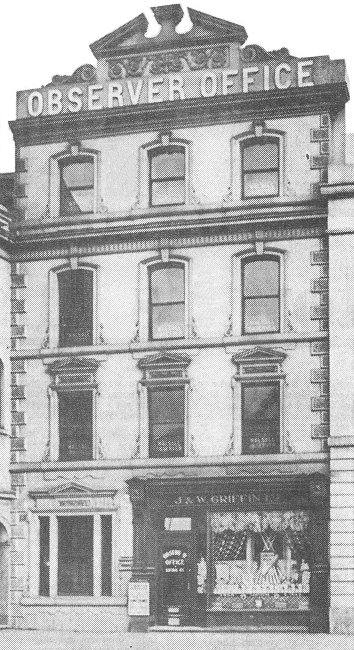 |
The old Walsall
Observer Office Building that stood next to
the George Hotel on The Bridge.
It was demolished at
the same time as the hotel to make way for
the new enlarged hotel. |
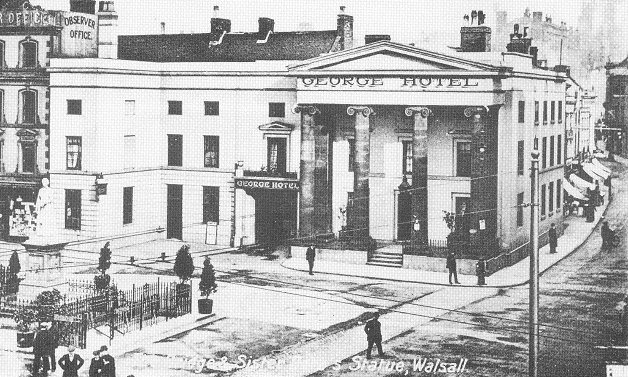 Another view of the George Hotel. From an
old postcard.
Another view of the George Hotel. From an
old postcard.
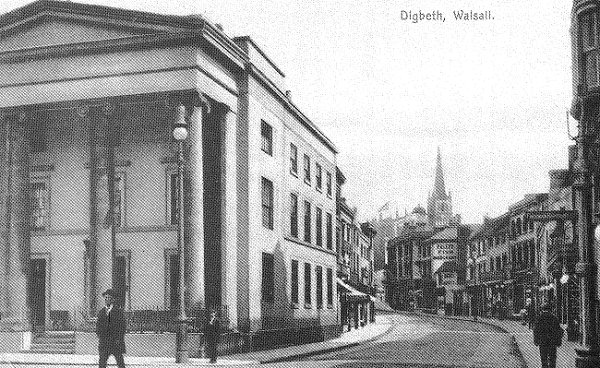 Another postcard view of the George Hotel.
Another postcard view of the George Hotel.
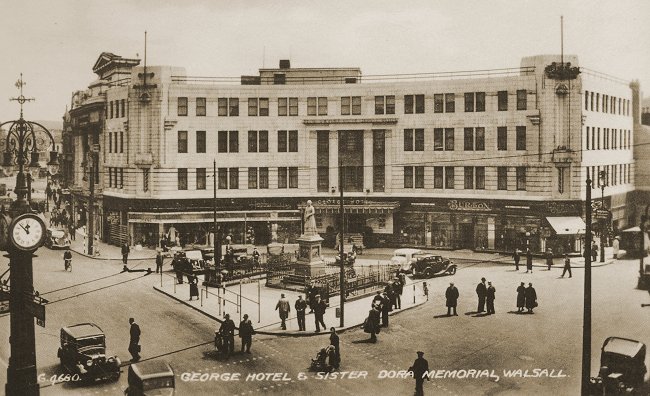 The new George Hotel which opened in 1935.
From an old postcard.
The new George Hotel which opened in 1935.
From an old postcard.
|
The Old George
By the late Mr. W. H. Duignan, in
an Observer article, 1878
The George Hotel is so much of a
public institution, and is associated with so many
memories, as to be worthy of a little record before
those memories get dim or have passed away. How many of
us have learned to dance there, what jolly balls we have
had; how we have fallen in love there, and fallen out
again; what good dinners we have eaten; what journeys we
have made thence on the old coaches and in post-chaises;
what election fights we have seen without it and what
scenes within it, when it was party headquarters, and
bribery treating and bottling voters were considered a
necessary part of political strife.
The house, too, has exercised an
important influence on the prosperity and progress of
the town. The founder of the house and his successors
were men of remarkable energy and enterprise. Prior to
1784 Walsall lay out of the line of traffic. The coaches
from London to Chester (then the starting point for
Ireland) passed through Stonnall and Brownhills, the
wagons through Aldridge, and by Shire Oak Tree; the
Liverpool, Manchester and North-west traffic through
Coleshill, Lichfield and Stone, or Birmingham and
Wolverhampton. The road to Birmingham was narrow and
circuitous, and that to Stafford passed by winding ways
up Green Lane, through Cannock and Penkridge, or through
Pelsall and Hednesford. Roads are the pioneers of
railways, and those who made the one attracted the
other.
From Dragon to George.
In 1781, Mr. Thomas Fletcher, one
of a family even then old and highly respected, gave up
the Dragon in High Street, which he had previously kept,
and built the George Hotel. The Bull's Head, in Upper
Rushall Street, was previously the head inn. Mr.
Fletcher, in 1784, obtained an Act of Parliament to make
the present road from Walsall to Stafford. He caused the
Birmingham road to be straightened and widened, and
gradually brought the coaching and posting through
Walsall.
The two great inns at Stonnall; the
Welsh Harp, now the residence of Mr. Edward Overton; and
the Swan, where Mr. George Wright lives, began to decay,
and Mr. Penn, the owner of the later house, brought his
Chester coach through Birmingham and Walsall, changing
horses at the Bull's Head, and coming down High Street,
the guard firing off his blunderbuss as he passed the
George in token of defiance.
Mr. Fletcher and his successors
(Messrs. Fletcher and Sharratt) promoted the improvement
of the roads on all sides down to 1831, when an Act was
obtained for making a new road from Snail's Green, near
the Scott Arms, through Perry Barr to Birmingham, the
old one passing by Hamstead and Handsworth church. The
rapid increase of Birmingham attracted the coaching and
the north-west road, through Walsall, being four miles
shorter than that by Wolverhampton, the town gradually
became a great thoroughfare, and no proprietor on the
London road paid greater attention to the excellence of
his horses than the owners of the George.
|
|
|
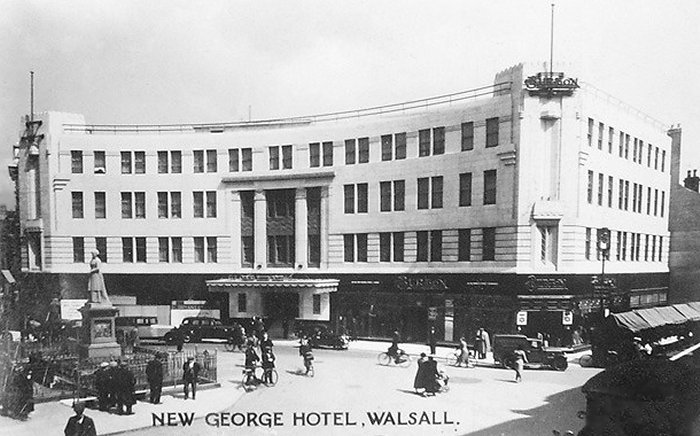 Another view of the new George Hotel from
the 1930s.
Another view of the new George Hotel from
the 1930s.
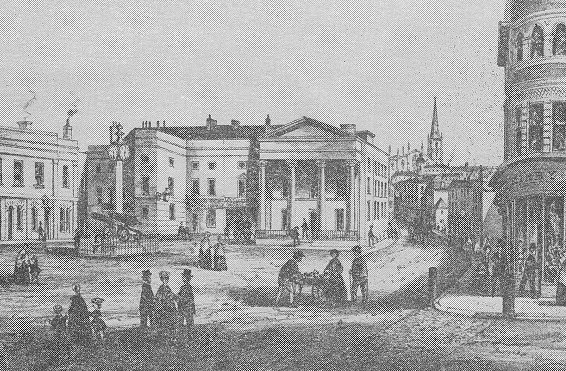 A final view of the old George Hotel from
the official luncheon menu for the reopening.
A final view of the old George Hotel from
the official luncheon menu for the reopening.
|
Fame as Coaching
House
In 1823 the front of the house was
remodelled, the pillars coming from Fisherwick Hall (the
residence of the Marquis of Donegal) which had been
demolished. Lord Hatherton was a great patron of the
house, and presided at the Colonnade Dinner in August,
1823. The late Lord Derby also frequented it on his
numerous journeys between Knowsley and London, and
usually stayed the night, occupying the whole house.
One incident should make the place
dear to every conservative heart. In the autumn of 1833,
whilst posting with his family from town, the old Lord
stayed as usual at the George, and the present Earl,
then only seven years of age, was taken alarmingly ill,
and had to remain there for some weeks. Nothing could
exceed the kindness of the hosts or of the Misses
Fletcher, or the gratitude of the Countess for the
attentions the young invalid received. A handsome brooch
and a grateful letter from the Countess to Miss Fletcher
were subsequently left by the Duke of Richmond at the
George, and are still proudly appreciated. Hamblin, who
lived where Dr. Mclachlan lives now, was the medical man
engaged and subsequently received through Lord Derby an
appointment as governor, I think of the Falkland
Islands.
The fame of the George as a great
coaching and posting house is, of course, a thing of the
past. We see no more the smart post-boys; the well-fed,
well groomed thoroughbreds no longer stand before the
door, with the expectant ostlers, and little groups
waiting for the latest news; we hear no more the guard's
horn; we have lost the glitter and the dash of the fast
mail. Those were the grand days of the house. They had
106 coach and posting horses in the stables at Walsall,
18 at the Crown at Cannock, 11 at Huntington, and six at
Pillaton, and every commercial traveller then had his
horse and gig.
The Red Rover:
At various times the following
coaches passed through Walsall daily: The Red Rover and the Railway from London
to Manchester; The Albion from London to Chester; The
Crown Prince, the Aurora and the Magnet, from London to
Liverpool; The Times and the Mail from Birmingham to
Sheffield; The Standard Pearl, and the Rapid, to Derby;
The York House from Bristol to Liverpool; The Mail from
Manchester to Bath; and the Lazy Liverpool; besides
coaches to Birmingham, Dudley, Wolverhampton, and
Lichfield.
The Red Rover was especially
well-appointed and very fast; the guards wore red hats
and it is said that their situations were worth £15 a
week. On the first of the month when it carried the
magazines it had six horses. It required ten horses to
work it between Walsall and Cannock. The guard and
coachman were fined 2s. 6d. a minute if behind time, and
at nine o'clock in the morning, punctually with the
Aurora and the Albion, it turned the corner of The
Bridge.
The Albion:
The Albion ran by the four Crosses
on Watling Street and had four splendid bays and four
chestnuts to work the eight miles. On one occasion when
bringing a load of convicts from Chester on their way to
Portland, the impatient chestnuts got the better of the
coachman at Pratt's Bridge, and ran away. Near the top
of Park Street, the coach came into collision with the
carriage of old Mr. Perks, the Sheriff's Officer, of
Spring Hill, and upset. Austin, the coachman, was
killed, as also was Mr. Illidge, the deputy Governor of
Chester Gaol; the near wheeler was also killed. Mrs.
Thomas Adams, of Walsall, escaped unhurt. The rest of
the passengers were all convicts, and were sent on as
soon as possible; but during their stay in Walsall they
managed to get a file, and between Coventry and
Dunchurch released themselves, overpowered the warders,
cut the traces, and escaped. Two got clear away but the
rest were recaptured.
Pearl and Rapid:
The Standard Pearl and the Rapid
were opposition coaches driven by Capt. Baring and Capt.
Douglas, and travelled at a reckless pace, on one
occasion coming from Birmingham to Walsall in 28
minutes. The Standard changed at the George, the Rapid
at the Bradford Arms, but came on to The Bridge to start
fair on the race to Derby.
On one occasion while coming down
the hill at the top of Ablewell Street, the cock-eye on
the pole of the Rapid broke, letting the splinter bars
fall on the leaders' hocks and throwing everything into
wild disorder. Capt. Douglas, however, was equal to the
occasion; he managed to turn his kicking leaders up Bank
Street, unhooked their traces, left them, and galloped
on with his wheelers. The racing of these coaches
immensely interested the schoolboys, who were divided
into Standard and Rapid factions.
The mill fleam which runs under the
clock was formerly an open stream and the horses and carriages belonging
to the George were washed in it. Part of it was arched
over opposite Mr. Kirby's (now Dunn's) shop, and on one
occasion the brickwork gave way under the Manchester
Mail, and one of the horses fell through, breaking his
legs. This mail was unfortunate in the way of bridges,
for it afterwards, on a dark night, drove into the
Trent, north of Stafford, the bridge carrying the road
having been washed away. The inside passengers were
drowned. One of them, named Newman, was a draper in High
Street.
"Lazy Liverpool":
The" Lazy Liverpool" was so called
because it was a slow, heavy coach carrying the luggage
of the fast coaches and passengers at cheap fares; it
was consequently crowded with sailors and Irish
pig-dealers. Some wag christened it the "Lousy
Liverpool," and it was known by that name for many
years. It did not change between Walsall and Stafford,
and was allowed three hours for the stage. It was due on
the down journey at midnight, and on one occasion,
starting in the dark, one of the leaders' reins got
twisted round the wheelers' territs, which sent the team
all awry, and the leaders against the balustrates of the
old bridge, knocking them into the brook and carrying
the horses after them, but not the coach. The leaders
hung by their traces, which had to be cut, and were got
out again without injury.
The Amity ran from Wolverhampton to
Sheffield, and was due in Walsall at 5 a.m. and 5 p.m.
Draycott, the horse-keeper, had a little dog, whose soul
was in the coach and horses. As soon as he saw his
master begin to harness the change horses he knew the
coach was due, and trotted off to meet it, going to Park
Street if morning, and into Lichfield Street if
afternoon, returning with uproarious delight under the
noses of the leaders. Poor little fellow, he made a
false step at last and was trampled to death by his
friends, leaving his master inconsolable.
The day coach to Birmingham was
driven by Bob Howson, and on one occasion, when coming
up the hill by Lyon's Den, the foot-board came off
dropping the coachman among the horses, the fore wheel
cut off a portion of his ear, the horses came safely on
to the George, but did not pull up well, and the leaders
mounted the steps, breaking the pole against the
pillars, but with no further mischief. In the good old
days, voting for the council members took place at
Stafford only, and the free and independent electors
were taken down in post-chaises (which only held two)
and were nobly entertained at Stafford and on the way
and back by their generous and patriotic candidates.
At these jolly times the post-boys
frequently rode the stage from Walsall to .
Stafford twice in the day, making
seventy miles of it. I think we have only two of the old
links left, Mr. Stephen Howse, who drove the Gloucester
Mail, the Tantivy, and sometimes the great Holyhead, and
was wise enough to make money and keep it; and poor old
Bob Newman, once the smartest of post-boys, now a poor
afflicted man of eighty five. Poor Bob! We shall never
see him again on the Bridge in spotless boots and
breeches, looking out for carriages, or hear him bawl up
the yard, "Four on, first and second turns out." Bob
once drove the Queen, when Princess Victoria, and
afterwards her mother, the Duchess of Kent, from
Wolverhampton to Shifnal. The Princess's servants paid
the post-boys 6/6 each, but the Duchess's paid 8/-, a
difference which is lovingly remembered by Bob to this
day.
|
|
|
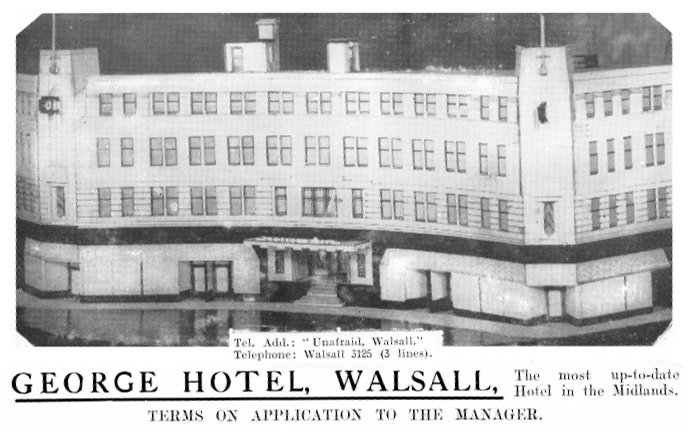
From the 1937 Walsall Red Book and Directory.
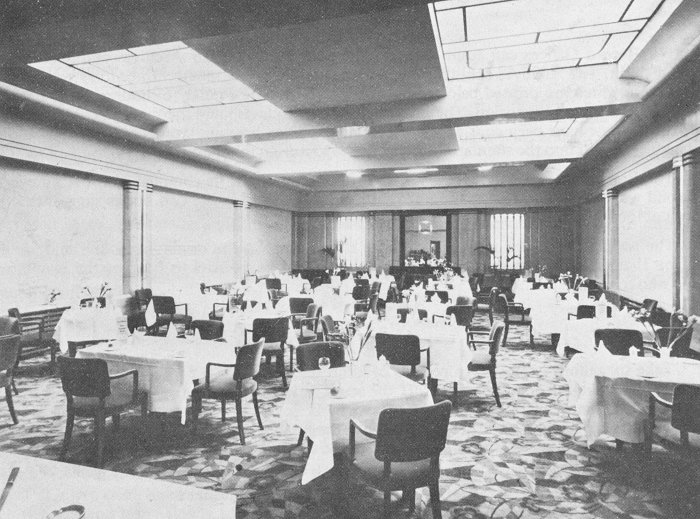
The dining room in the 1930s.
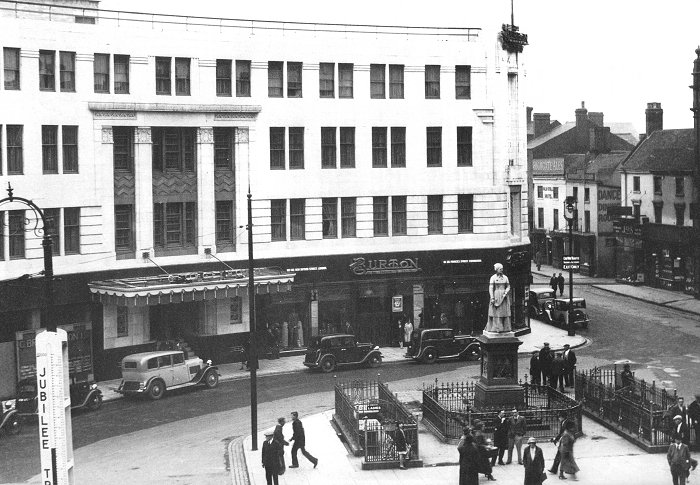
The George Hotel in the mid 1930s.
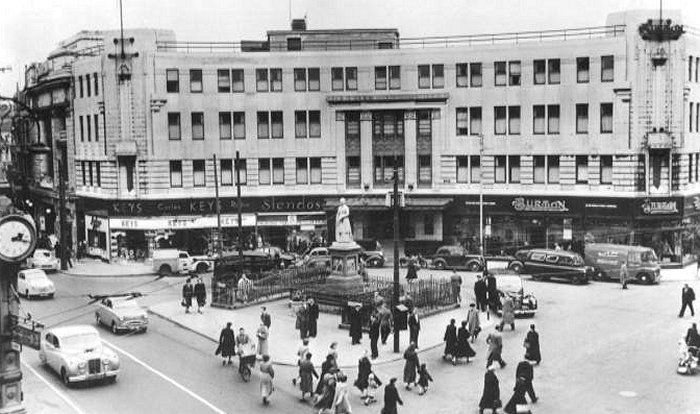
The George Hotel in the 1950s.
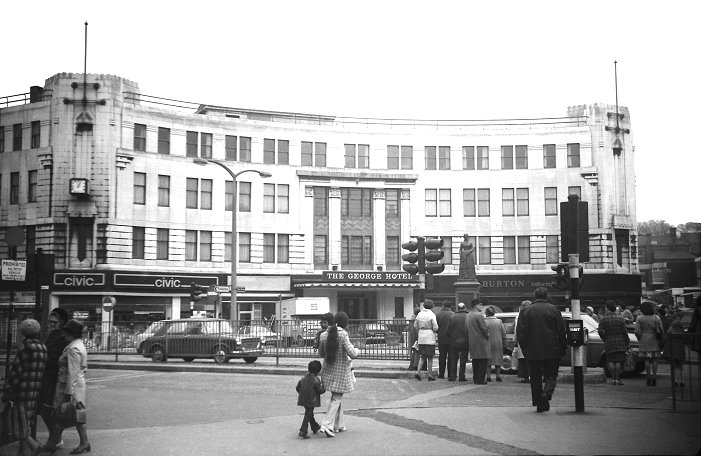
The George Hotel in the early
1970s. Courtesy of Will Parker. It was demolished in
1979 when Tesco acquired the site. |
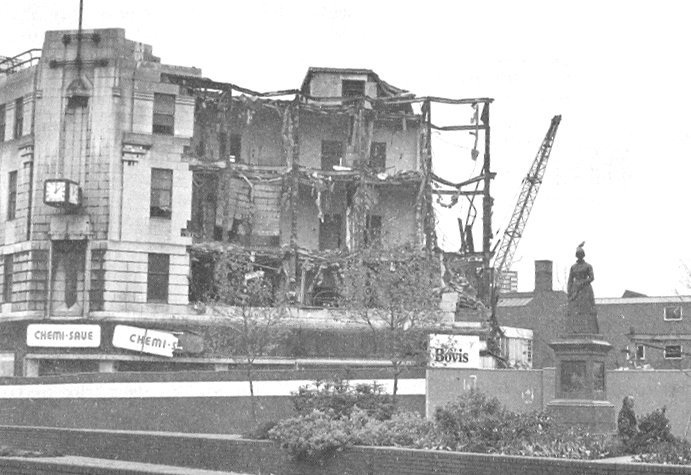
Demolition in 1979.
 |
|
 |
|
 |
Return to
Pat Collins |
|
Return to
the beginning |
|
Proceed
to
World War Two |
|


























